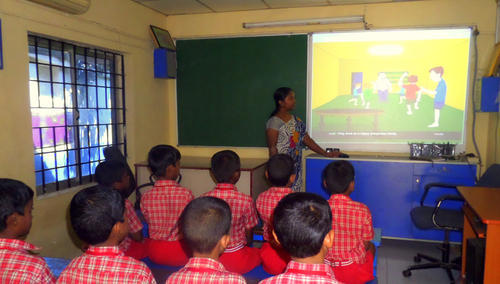What Can Indian Education Learn From Online Learning

Brief Summary: This article discusses the prospects of online education in India. It explains how digital learning can complement and boost the existing education system of the country.
Introduction
In May 2020, Finance Minister Nirmala Sitharaman had announced many new initiatives to bolster digital education in India. The most notable among these were the introduction of 12 new TV channels, one for each grade in K-12.
This is going to be a great advantage to a vast majority of the Indian population, because many of them do not have access to an internet connection. The introduction of TV channels will ensure a wider reach for digital education in India.
A New Era
India is behind countries like the USA and China when it comes to the expanse of online education. Though the pandemic has given a shot in the arm to digital learning programs in the country. What digital education could have hoped to achieve in about five years, has been achieved in a matter of months.
Role of Teachers
Teachers have played a big role in the spread of online education in India. They have realized the many benefits of e-learning, which has made the shift more sustainable. This means that digital education is here to stay, and grow exponentially.
The Covid-19 pandemic has made it crucial for teachers to innovate. Months of using technology as an indispensable tool to impart education has made them adept at using this method of teaching. This might form the basis of a life-long habit.
The Factory Model
The Indian education system follows a factory model. In this model, children are seen as parts of an assembly line and are receptacles of homogenized knowledge. There is no place for personalization in this model.
Digital education offers the scope for personalization. Students can learn at their own pace, and enjoy greater flexibility when it comes to choosing subjects.
Socialization
Apart from the obvious aim of gaining knowledge, schools serve a second function as well. They provide the earliest opportunities of socialization for children. On top of conventional learning, students also learn and pick up various socialization skills.
This socialization is not always formal or supervised by the educational institution. Students develop their personalities through interacting with each other, and based on various scenarios.
This kind of socialization is not available on the digital platform. However, EdTech companies are aware of this discrepancy and are looking to fill the gaps. Many digital education programs are coming up with social and group learning to promote socialization and a feeling of teamwork in children.
Homeschooling
Technology is set to create lasting changes in the Indian education system. A parallel homeschooling system is already part of the education system, thanks to a huge private tutoring market.
But homeschooling has still not achieved a formal status in the country. The main reason for this is price. For homeschooling to be an affordable option for the masses, at least four to five children need to be homeschooled together.
Homeschooling puts the onus of teaching on parents, and not all parents are equipped to handle this specialized responsibility. Moreover, there is no standard curriculum that can guide parents while choosing what to teach their children.
For these reasons, homeschooling in India has been largely restricted. But digital education can change the scenario. A group of children can study together online, from various parts of the country. They can share fees, making education more affordable.
The new TV channels will make homeschooling easier as well. Students can gain access to high quality content at the click of a remote button, from the comfort of their homes.
Free Content
The TV channels announced by the government will make education virtually free for the masses. But the quality of content needs careful monitoring, so that the entire process is not deemed futile.
Digital education companies have to facilitate the learning process by providing value-added services. The presence of a mentor, dedicated time slots, examinations, career counselling, course certifications are different services that will enrich the digital education process.
Challenges
Digital education in India faces a few challenges. They are:
- Keeping learners engaged. Online teaching is in effect a one-way process, and it is difficult to hold the attention of students.
- Online teaching has little or no room for personalized tutoring. It cannot solve specific questions of individual students.
- Online education strips the process of its social aspect. In an age where children are more isolated, it is indeed an added problem.
- Measuring the results of the teaching program.
Conclusion
Like all new things, digital learning needs teething time. Once the chinks are ironed out, the Indian education system will be more effective and holistic.









